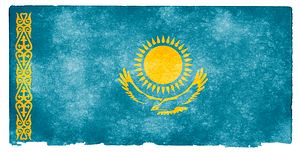Tokhtar Tuleshov, a Kazakh businessman presently on trial behind closed doors in Astana for allegedly plotting to overthrow the government, testified via video in the Atyrau trial of two activists accused of “inciting social discord, intentionally distributing false information, and illegally organizing public gatherings” this spring.
In July, I described the strange story that ties Tuleshov to the land code protests as a “movie-quality crime-lord epic,” which took “a strange turn into political theater.”
Tuleshov was arrested in January 2016 along with three associates. Reuters noted at the time that his detention followed “a crackdown by Astana on both pro-Russian and nationalist activists.” After a spring ripe with protests over pending changes to the land code, which unfounded rumors said would open Kazakh land to foreign ownership, Tuleshov’s name popped up as a orchestrator. He stands accused, among other things, of parceling out money to the activists who staged the protests — no matter that they occurred four months after he was arrested.
Tuleshov’s trial began last month in a military court in Astana behind closed doors. The business magnate sits accused along with 24 others, including former government officials. Ahead of the trial, a documentary aired on a Kazakh TV channel detailing Tuleshov’s shadowy criminal past. EurasiaNet published a review of the documentary, with the author commenting in the end that after the documentary aired, “similar accounts appeared in several major online national media outlets — word for word.”
With little information about Tuleshov’s trial available, it’s striking that the testimony he offered in the Atyrau trial of Talghat Ayan and Maks Boqaev appears to depict himself as exactly what the state accuses him of being: the funder of the land code protests. As reported by RFE/RL:
Testifying via video link from Astana, Tokhtar Toleshov said on October 17 that his assistants gave $100,000 to Talghat Ayan to organize the protests, which were some of the largest seen in Kazakhstan in years.
Ayan and Boqaev, the head of a human rights NGO and an activist and lawyer respectively, are accused of organizing protests that gained unprecedented momentum before being quashed by the state. The two were among many arrested ahead of a planned nationwide protest scheduled for May 21. FIDH, a human rights organization, notes that they were arrested on May 17, “in retaliation for their critical statements posted on Facebook and for making public their intention to participate and encouraging others to take part in the 21 May protests.”
They were arrested for organizing protests after filing the appropriate requests with local authorities to legally hold protests. (Requests to hold protests were denied across the board and those who filed arrested before the protests took place.) The two face possible sentences of 10 years each.































